Ms. María Fernanda Espinosa Garcés, who was inaugurated as president of the UN General Assembly on 17 September 2018, came to Japan in August 2018 and visited Sophia University in Tokyo to have a dialogue with students and professors.
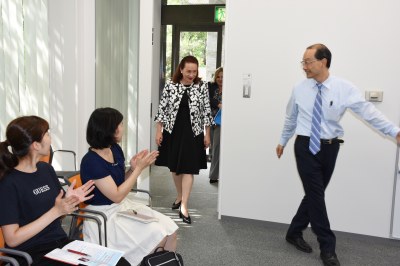
After President Espinosa met Prime Minister Shinzo Abe and Foreign Minister Taro Kono, she arrived at Sophia Institute of International Relations in the afternoon of August 31 and made a presentation titled “How to Strengthen the UN: Gender and Peace and Security.” There was very intensive discussion between President Espinosa and students and faculty members for one and a half hours.
President Espinosa has had an incredible career as a poet, academic scholar, diplomat, and politician. She served Ecuador as Minister for Foreign Affairs, Minister for National Defense, Coordinated Minister for Natural and Cultural Heritage, as well as Ecuador Ambassador to the United Nations in both New York and Geneva. She was elected in June 2018 as president of the 73rd session of the UN General Assembly, which began in September 2018. President Espinosa is the fourth female president of the UN General Assembly and the first female president from Latin America and the Caribbean.
Dr. Daisaku Higashi, professor at Sophia University, welcomed President Espinosa and moderated the dialogue. Dr. Miki Sugimura, vice president of Sophia University, and Dr. Tadashi Anno, director of Sophia Institute of International Relations, made the opening remarks.
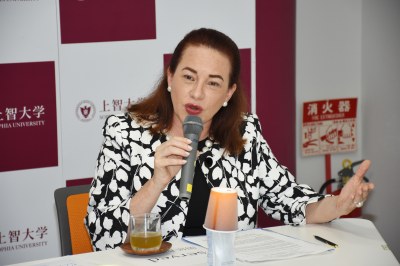
In her presentation, President Espinosa emphasized that, while women have often been portrayed as just victims of military conflicts and wars, they play a crucial role in solving them and it was therefore necessary to empower and involve women fully in all aspects of peace and security. Stressing that “peace is indispensable for sustainable development,” President Espinosa argued that inclusivity is crucial to succeeding in the peace process; therefore, “the involvement and active participation of women, who are half the population, is critical for the success of peace negotiations and peacebuilding.”
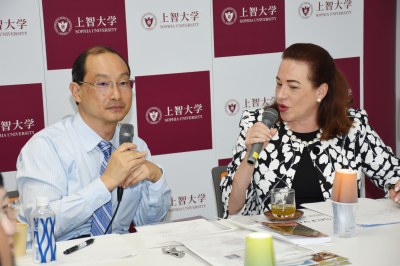
In reality, however, only 2 percent of UN mediators dealing with conflicts are women, she said; thus, she will do her best to increase the number of female mediators as president of the UN General Assembly. In fact, when President Espinosa was Minister for National Defense, she promoted initiatives to ensure equal status for women in the military of Ecuador.
In conclusion, President Espinosa stressed that addressing the challenges for women to participate in peace processes and peacebuilding, required partnerships and collaboration across all sectors and she expressed her commitment to advance this agenda, in collaboration with member states, academics, and civil societies. She concluded with a call to students and faculty of institutions such as Sophia University to influence public debate and policy to ensure inclusive policies that are indispensable for sustaining peace and achieving sustainable development.
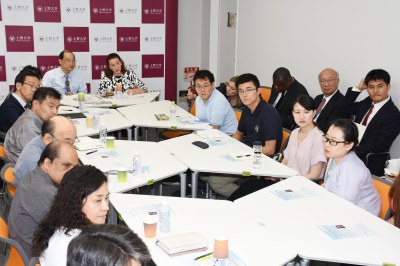
After her presentation, Professor Daisaku Higashi, who is specialized in mediation and peacebuilding, made the first comments and question; Dr. Higashi used to work for the UN Assistance Mission in Afghanistan as a team leader for reconciliation and reintegration, and he worked on advancing political negotiations between the Afghan government and the insurgency. He stated, “I am convinced that it is vital for women to participate in the negotiations on the Afghan conflict because how to protect women’s rights is one of the most crucial issues for potential peace talks in Afghanistan.”
At the same time, there is imbedded culture in Afghanistan on the roles of women and “it might be very risky for the outside mediators to impose the participation of women in the peace negotiation.” Professor Higashi asked how the international mediators should deal with these cultural challenges.
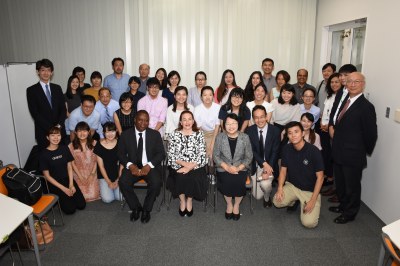
President Espinosa responded that it is true that imposing ideas from outside on local stakeholders will not be successful; thus, it is important for the international community and actors to communicate with local stakeholders and encourage “indigenous and internal changes” by local people in the roles of women in the peace process.
Following this exchange, there were many questions from both students and professors, including on issues regarding the reform of UN Security Council, global trade, nuclear proliferation, and protection of minorities, which is one of President Espinosa’s areas of expertise. She responded to each of these questions in detail and with a passion to create a mutual understanding.
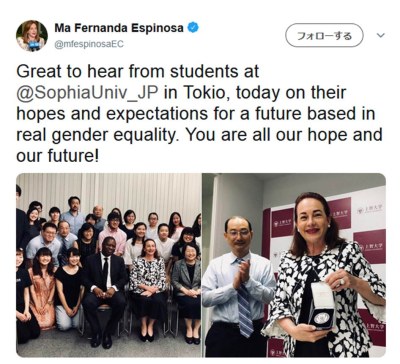
After the session, she was given flowers and mementos from Sophia University, and she was photographed with all the participants and signed the university memorial book. Later, she kindly posted a Tweet about her visit.
(This event was co-organized by Sophia University and Ministry of Foreign Affairs in Japan.)